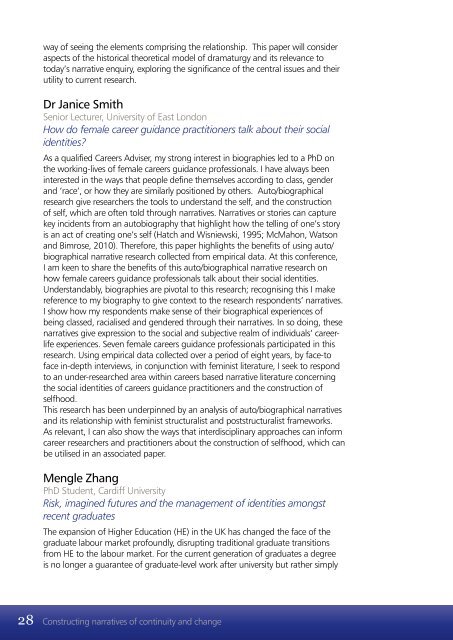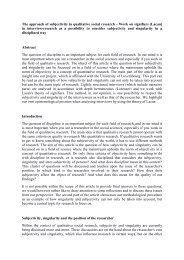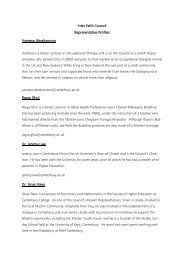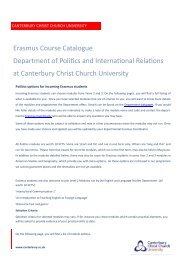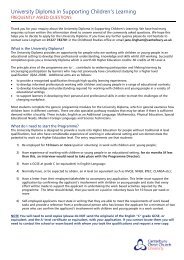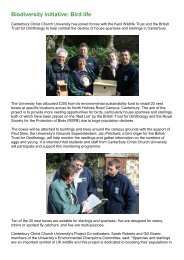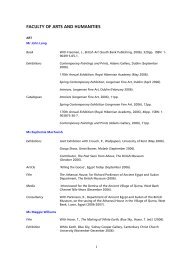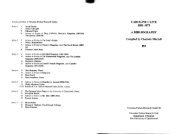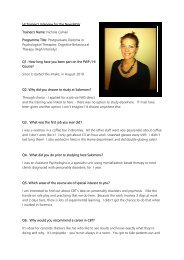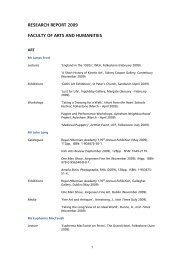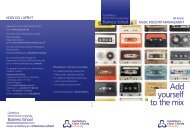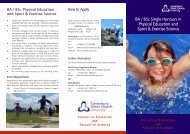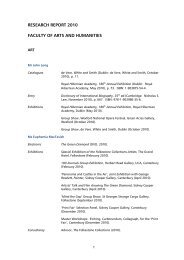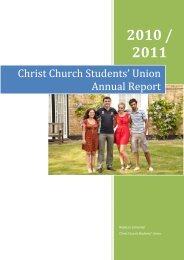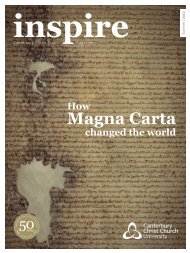Constructing narratives of continuity and change - Canterbury Christ ...
Constructing narratives of continuity and change - Canterbury Christ ...
Constructing narratives of continuity and change - Canterbury Christ ...
You also want an ePaper? Increase the reach of your titles
YUMPU automatically turns print PDFs into web optimized ePapers that Google loves.
way <strong>of</strong> seeing the elements comprising the relationship. This paper will consider<br />
aspects <strong>of</strong> the historical theoretical model <strong>of</strong> dramaturgy <strong>and</strong> its relevance to<br />
today’s narrative enquiry, exploring the significance <strong>of</strong> the central issues <strong>and</strong> their<br />
utility to current research.<br />
Dr Janice Smith<br />
Senior Lecturer, University <strong>of</strong> East London<br />
How do female career guidance practitioners talk about their social<br />
identities?<br />
As a qualified Careers Adviser, my strong interest in biographies led to a PhD on<br />
the working-lives <strong>of</strong> female careers guidance pr<strong>of</strong>essionals. I have always been<br />
interested in the ways that people define themselves according to class, gender<br />
<strong>and</strong> ‘race’, or how they are similarly positioned by others. Auto/biographical<br />
research give researchers the tools to underst<strong>and</strong> the self, <strong>and</strong> the construction<br />
<strong>of</strong> self, which are <strong>of</strong>ten told through <strong>narratives</strong>. Narratives or stories can capture<br />
key incidents from an autobiography that highlight how the telling <strong>of</strong> one’s story<br />
is an act <strong>of</strong> creating one’s self (Hatch <strong>and</strong> Wisniewski, 1995; McMahon, Watson<br />
<strong>and</strong> Bimrose, 2010). Therefore, this paper highlights the benefits <strong>of</strong> using auto/<br />
biographical narrative research collected from empirical data. At this conference,<br />
I am keen to share the benefits <strong>of</strong> this auto/biographical narrative research on<br />
how female careers guidance pr<strong>of</strong>essionals talk about their social identities.<br />
Underst<strong>and</strong>ably, biographies are pivotal to this research; recognising this I make<br />
reference to my biography to give context to the research respondents’ <strong>narratives</strong>.<br />
I show how my respondents make sense <strong>of</strong> their biographical experiences <strong>of</strong><br />
being classed, racialised <strong>and</strong> gendered through their <strong>narratives</strong>. In so doing, these<br />
<strong>narratives</strong> give expression to the social <strong>and</strong> subjective realm <strong>of</strong> individuals’ careerlife<br />
experiences. Seven female careers guidance pr<strong>of</strong>essionals participated in this<br />
research. Using empirical data collected over a period <strong>of</strong> eight years, by face-to<br />
face in-depth interviews, in conjunction with feminist literature, I seek to respond<br />
to an under-researched area within careers based narrative literature concerning<br />
the social identities <strong>of</strong> careers guidance practitioners <strong>and</strong> the construction <strong>of</strong><br />
selfhood.<br />
This research has been underpinned by an analysis <strong>of</strong> auto/biographical <strong>narratives</strong><br />
<strong>and</strong> its relationship with feminist structuralist <strong>and</strong> poststructuralist frameworks.<br />
As relevant, I can also show the ways that interdisciplinary approaches can inform<br />
career researchers <strong>and</strong> practitioners about the construction <strong>of</strong> selfhood, which can<br />
be utilised in an associated paper.<br />
Mengle Zhang<br />
PhD Student, Cardiff University<br />
Risk, imagined futures <strong>and</strong> the management <strong>of</strong> identities amongst<br />
recent graduates<br />
The expansion <strong>of</strong> Higher Education (HE) in the UK has <strong>change</strong>d the face <strong>of</strong> the<br />
graduate labour market pr<strong>of</strong>oundly, disrupting traditional graduate transitions<br />
from HE to the labour market. For the current generation <strong>of</strong> graduates a degree<br />
is no longer a guarantee <strong>of</strong> graduate-level work after university but rather simply<br />
28 <strong>Constructing</strong> <strong>narratives</strong> <strong>of</strong> <strong>continuity</strong> <strong>and</strong> <strong>change</strong>


